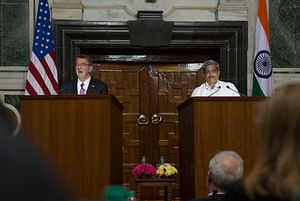U.S. Defense Secretary Ashton Carter and his Indian counterpart, Defense Minister Manohar Parrikar, pledged to deepen Indo-U.S. military ties in a joint statement issued today. Both senior defense officials envision deeper cooperation in the field of maritime security and military technology in particular. The U.S. defense secretary is currently on an official three-day visit to India on the invitation of the Indian defense minister. Carter is scheduled to depart the country on April 13.
Like in previous statements, both sides pledged to expand collaboration on the so-called Defense Technology and Trade Initiative (DTTI) in order to expand Indo-U.S. military industrial ties, and support Indian Prime Minister Narendra Modi’s “Make in India” efforts to bolster India’s indigenous defense industry.
In addition, India and the United States welcome “new opportunities to deepen cooperation in maritime security and Maritime Domain Awareness; military-to-military relations; the knowledge partnership in the field of defense; and regional and international security matters of mutual interest.” Among other things, both sides agreed to increase the number of joint military exercises and to step up their complexity.
Carter and Parrikar also announced “their principle agreement to conclude a Logistics Exchange Memorandum of Agreement [LEMA], and to continue working toward other facilitating agreements to enhance military cooperation and technology transfer.” Once signed, the LEMA would offer a framework for both India and the United States to share military logistics. (The Communication and Information Security Memorandum of Agreement as well as the the Basic Exchange and Cooperation Agreement were not mentioned in the statement.)
India and the United States will also launch a bilateral Maritime Security Dialogue and commence Navy-to-Navy discussions on submarine safety and anti-submarine warfare. They also pledged to conclude a data sharing agreement on commercial shipping traffic.
Addressing regional security issues, Carter and Parrikar pledged to ensure “freedom of navigation and over flight throughout the region, including in the South China Sea.” In addition, they vowed their support “for a rules-based order and regional security architecture conducive to peace and prosperity in the Asia-Pacific and Indian Ocean, and emphasized their commitment to working together and with other nations to ensure the security and stability that have been beneficial to the Asia-Pacific for decades.”
Under the DTTI, they agreed to two new pathfinder projects on Digital Helmet Mounted Displays and the Joint Biological Tactical Detection System. Carter and Parrikar also emphasized that both countries will deepen consultations and exchanges on aircraft carrier design and operations, and jet engine technology.
The United States’ offer to help prop up the Indian Air Force’s depleted fleet of combat aircraft also got a mention in the statement: “In support of Make in India, the United States shared two proposals to bolster India’s suite of fighter aircraft for consideration of the Government of India.”
Both sides also welcomed recent progress on India-U.S. science and technology cooperation including “the finalization of four government-to-government project agreements in the area of science and technology cooperation: Atmospheric Sciences for High Energy Lasers, Cognitive Tools for Target Detection, Small Intelligent Unmanned Aerial Systems, and Blast and Blunt Traumatic Brain Injury.”

































